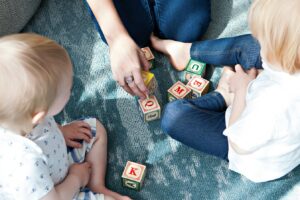Children's Therapy
Is your child struggling with behavior problems?
Is your child showing signs of emotional difficulties?
Common Mental Health and Behavioral Concerns in Children
Children face a wide range of mental health and behavioral issues that can significantly impact their well-being and development. Recognizing and addressing these concerns early through therapy can provide essential support and tools for children to thrive. Here are some of the most common mental health and behavioral concerns seen in children in therapy.
Symptoms of ADHD:
- Inattention: Difficulty sustaining attention, easily distracted, forgetful.
- Hyperactivity: Fidgeting, inability to stay seated, excessive talking.
- Impulsivity: Interrupting others, difficulty waiting for their turn, acting without thinking.
Therapy Approaches for ADHD:
- Behavioral therapy to develop organizational and time-management skills.
- Parent training to support and manage the child’s behavior.
- Cognitive-behavioral therapy (CBT) to address negative thought patterns.
Symptoms of Anxiety:
- Excessive worry or fear about various aspects of life.
- Physical symptoms like headaches, stomachaches, and sleep disturbances.
- Avoidance of situations that cause anxiety.
Therapy Approaches for Anxiety:
- Cognitive-behavioral therapy (CBT) to identify and challenge anxious thoughts.
- Relaxation techniques and mindfulness to manage anxiety symptoms.
- Exposure therapy to gradually face and overcome fears.
Symptoms of Depression:
- Persistent sadness or irritability.
- Loss of interest in activities once enjoyed.
- Changes in appetite or sleep patterns, fatigue, and feelings of worthlessness.
Therapy Approaches for Depression:
- Cognitive-behavioral therapy (CBT) to challenge negative thoughts and behaviors.
- Interpersonal therapy (IPT) to improve relationships and communication.
- Family therapy to address dynamics that may contribute to depression.
Symptoms of Behavioral Problems:
- Defiance, aggression, and rule-breaking behavior.
- Frequent temper tantrums and arguing with authority figures.
- Difficulty managing anger and frustration.
Therapy Approaches for Behavioral Problems:
- Behavioral therapy to reinforce positive behaviors and reduce negative ones.
- Parent-child interaction therapy (PCIT) to improve the parent-child relationship.
- Social skills training to help children interact positively with peers.
Symptoms of Trauma & PTSD:
- Re-experiencing the traumatic event through flashbacks or nightmares.
- Avoidance of reminders of the trauma.
- Hyperarousal symptoms like irritability, difficulty sleeping, and being easily startled.
Therapy Approaches for Trauma & PTSD:
- Trauma-focused cognitive-behavioral therapy (TF-CBT) to process the trauma.
- Play therapy for younger children to express and work through their trauma.
- Eye Movement Desensitization and Reprocessing (EMDR) for processing traumatic memories.
Symptoms of Bullying:
- Withdrawal from social interactions and activities.
- Decline in academic performance.
- Physical complaints like headaches and stomachaches, and emotional distress.
Therapy Approaches for Bullying:
- Supportive counseling to build self-esteem and resilience.
- Social skills training to improve peer interactions.
- Examine the structure of the child’s friendship groups.
- Family therapy to support the child and develop coping strategies.
Symptoms of Family Changes:
- Emotional distress and confusion about the changes in the family.
- Changes in behavior, such as aggression or withdrawal.
- Academic difficulties and changes in peer relationships.
Therapy Approaches for Family Changes:
- Family therapy to address changes in family dynamics and support adjustment.
- Individual counseling to provide a safe space for children to express their feelings.
- Play therapy to help younger children process their emotions.
Symptoms of Grief and Loss:
- Intense sadness and longing for the deceased.
- Changes in behavior and academic performance.
- Physical complaints and sleep disturbances.
Therapy Approaches for Grief and Loss:
- Grief counseling to help children understand and process their loss.
- Support groups to connect with others who have experienced similar losses.
- Creative therapies, such as art or music therapy, to express emotions.
Our Pediatric Therapists Can Help

Play Therapy for Kids
Play therapy for children is an effective and fun method of treatment for children. Play Therapy offers a safe, therapeutic way for children to express themselves in a way that is natural to them….through play.
Young children and toddlers may not yet possess the verbal skills to communicate what is troubling them. Older children may have the verbal skills, but they may be hesitant to speak about their stressors and feelings. Play therapy gives children an outlet to communicate, process, and ultimately resolve issues with their therapist.
Family Conflict Resolution
Sometimes children develop certain emotions and behavior because of something that has occurred that has affected the entire family. In this case, family therapy with a neutral and objective professional who can help clarify the underlying problems that are fueling the conflict in the family. Family conflict can occur in relationships between parents and children, between siblings, and also can occur following the blending of families.
Therapy for Older Children
Many older children and adolescents prefer to be treated as young adults and respond best to a combination of play therapy techniques geared toward teens and adult “talk therapy.” These children and teens are capable of talking about what is bothering them and have the ability to try new solutions to solve their problems. We try to help them look objectively at their behaviors, feelings and thoughts and the situations in which they occur. Learn more about therapy for teens.
Therapy Support for Parents
Occasionally, parents simply need support from someone who understands and has experience identifying solutions for children with emotional and behavioral challenges. Working with a BATT therapist could be the answer you are looking for. Consultation sessions with therapists who specialize in child and adolescent therapy are available to discuss potential options for your children or to discuss services that may best fit the needs of your family as a whole.
We are committed to helping parents help their children live a more successful and fulfilling life. We can help you prioritize the needs of your child and provide parenting strategies for you to use at home that will also nurture the bond between you and your child.
If you are ready to explore the therapy and counseling options available for you and your child, contact us today to set up an appointment!

Resources
Anxiety Disorders Association of America
The Anxiety Disorders Association of America (ADAA) is a nonprofit organization whose mission is to promote the prevention, treatment and cure of anxiety disorders.
Freedom from Fear
Freedom From Fear is a national not-for-profit mental health advocacy association who seek to impact the lives of people affected by anxiety, depression, and related disorders.
National Institute of Mental Health
The National Institute of Mental Health (NIMH) is the lead Federal agency for research on mental and behavioral disorders. NIMH works to improve mental health through biomedical research on mind, brain, and behavior.
Children's Therapy Articles

What To Expect In ADHD Therapy For Kids
If your child has been diagnosed with Attention-Deficit/Hyperactivity Disorder (ADHD), you may be wondering what steps to take next. One helpful option is ADHD therapy

Is Play Therapy Effective For ADHD?
When children are diagnosed with Attention-Deficit/Hyperactivity Disorder (ADHD), parents often explore different therapy options to help with focus, self-control, and emotional regulation. One approach that

Play Therapy Techniques for Young Children
Play is a natural and essential part of childhood. It’s how children explore the world, express their feelings, and develop social skills. For young children,
